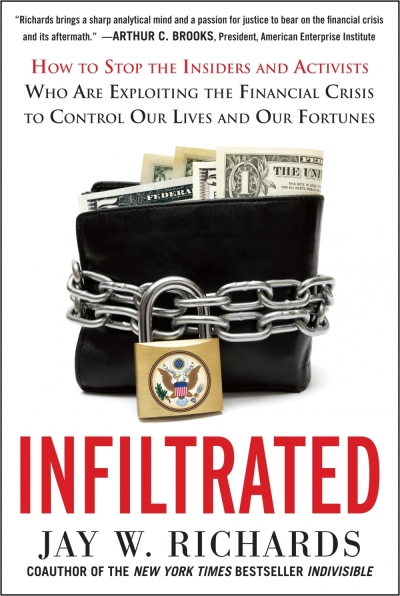Was Jesus a Capitalist? Christian Scholar Argues for Free Market, New Understanding of Financial Crisis

A Christian apologist, scholar, and intelligent design advocate claimed all biblical believers should support free markets, and argued that economic illiteracy, rather than Wall Street greed, caused the 2008 financial crisis.
Biblical principles show that free markets are the best way to organize society, argued Jay Richards, senior fellow at the Discovery Institute, visiting scholar at the Institute for Faith, Work, and Economics, and author of Infiltrated: How to Stop the Insiders and Activists Who are Exploiting the Financial Crisis to Control Our Lives and Our Fortunes, in a Thursday interview with The Christian Post. He also claimed that Christians should learn economics to be good citizens. Nevertheless, he clarified, "I wouldn't go so far as to say 'if you read the Bible, you'll affirm Capitalism because Jesus was a Capitalist.'"
Capitalism provides the framework where "people's ingenuity and their creative freedom can be most manifest so they can create value for themselves and others," the scholar contends. With a basic moral framework defending private property and the profits that hard-working innovators make by meeting other people's needs, even greedy people will strive to serve others, he argues.
Richards argued that Adam Smith's version of market economics channels the evil of greed into good service. "The butcher, the brewer, and the baker, we don't expect our dinner from their benevolence, but from their regard to their own interest," he explained. Even if the butcher is greedy, the best way he can make money is to provide something that people will freely buy.
"We have a moral obligation as Christians, if we want to advocate policies that we think are consistent with our moral values, to think through the consequences of policies," Richards argued. He claimed that the economic crisis of 2008 resulted from economic illiteracy, where policymakers acted with good intentions but produced bad consequences.
The apologist compared these administrators to a Boeing engineer, who may want to help people, but needs to know the principles of aerodynamics and basic physics in order to make planes fly. Unfortunately, "the same confused economic ideas I had in the '80s are just as alive and current in the minds of 20-year-old college students in 2013," he said, blaming "misinformation on economic reasoning in the schools."
He did not argue for all Christians to pursue a degree in economics, but warned that "if we really are concerned about social justice and manifesting our values in the public square, we can't ignore economic reasoning."
To demonstrate the importance of Christian economic reasoning, Richards pointed to the idea of usury. For 1500 years, the word didn't mean "charging excessive interest," but "charging for moneylending at all." The Ancient Greek philosopher Aristotle taught that money is sterile and doesn't hold intrinsic value. Christians believed this, and said that when Peter lends Paul ten dollars and charges interest, Peter is defrauding Paul, charging him for something of no value.
Usury may seem like a small matter to moderns, but to historic Christians "it wasn't just a minor moral peccadillo," the scholar noted. Dante put usurers in the seventh level of hell.
After hundreds of years of debate, Richards noted, John Calvin first embraced the idea of modern banking – lending money at interest – and Catholics, Protestants, and Orthodox Christians all followed suit.
"When you lend money and charge interest you're charging for the opportunity cost you give up in lending the money and you're charging for the risk that you bear that it won't be paid back," the scholar explained. Peter is providing a service for Paul, because instead of spending that ten dollars, he lets Paul use it, and he takes the risk that Paul might not pay him back. In other words, interest is fair, he explained.
This idea of lending money at interest undergirds our entire banking system, and it took the West hundreds of years to figure it out, Richards noted. He also referred to statements from Buddha, Plato, and Aristotle against the idea, and claimed that Islam still forbids it.
Richards said he wrote his book for a general audience, to educate both Christians and non-Christians about the financial crisis and economics in general. "I think if people are really interested in understanding what happened with the financial crisis, the role that good intentions played, what we can do about it, and how we ought to think about economics in general, I think this is the book that they ought to read," he said.





















